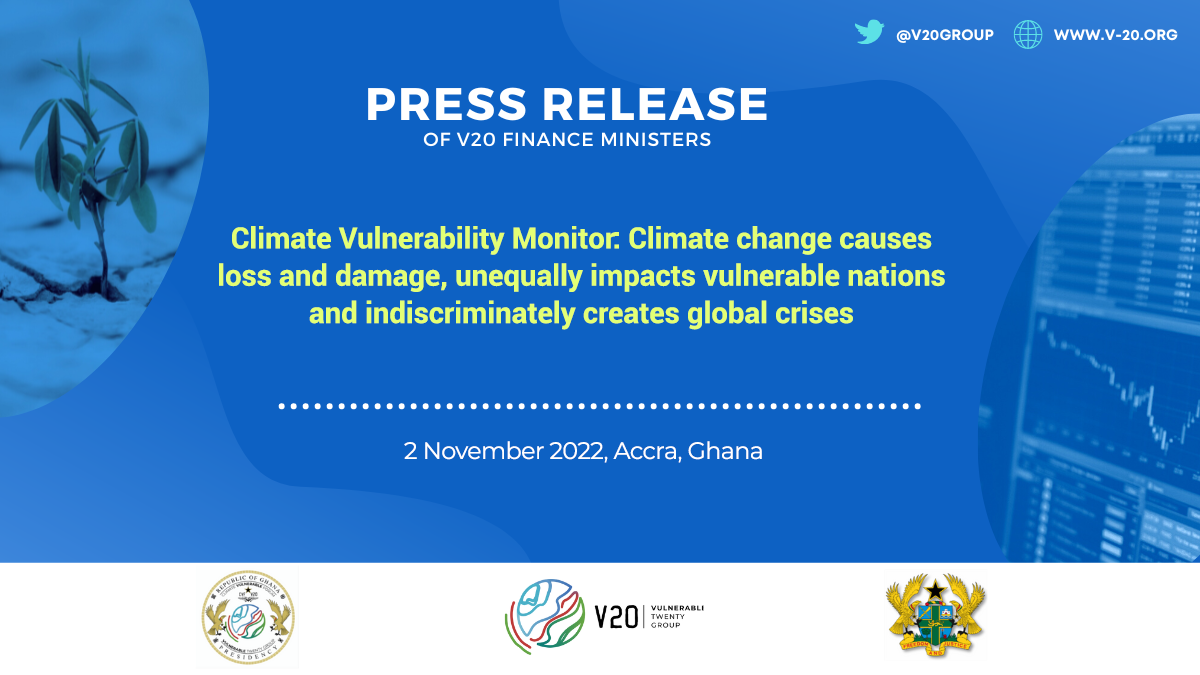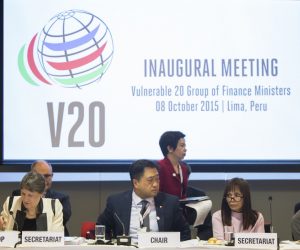Climate Vulnerability Monitor: Climate change causes loss and damage, unequally impacts vulnerable nations and indiscriminately creates global crises

Accra, Ghana, 2 November 2022 – A flagship report entitled “Climate Vulnerability Monitor, 3rd edition: A Planet on Fire”, commissioned by the Climate Vulnerable Forum (CVF) and the Vulnerable Twenty (V20) Group of Ministers of Finance of the CVF presented stark proof that climate change impacts generate loss and damage, globally creating crises for society, human health, and development. Disclosing comprehensive new data on the impact of climate change, the report also highlighted the asymmetric consequences for a society that deepens global inequalities with poorer and more vulnerable nations the hardest hit.
The third edition of the Climate Vulnerability Monitor (CVM3), a research program into the impact of climate change publicly released today, is the product of a multi-year research program involving a multi-organization science consortium led by the Global Center on adaptation, Climate Analytics, the Lancet Countdown and fires, as well as 14 regional partner organizations.
The Monitor consolidates the latest research from the scientific literature on the attribution of climate change in 32 distinct indicators of socio-economic and environmental change and impact phenomena. The Monitor projects and compares how, for a wide range of countries, these impacts evolve throughout the 21st century under a climate and socio-economic scenario that limits warming to 1.5°C, versus a below 2°C scenario, and a high emissions scenario without climate action to reduce emissions or mobilize additional adaptation efforts. The CVM3 findings illustrate the significant extent to which limiting warming to 1.5ºC could contain otherwise enormous losses and damage for the world this century.
The CVM3 and its scenarios and modeling are informed by the Intergovernmental Panel on Climate Change’s (IPCC) latest Sixth Assessment Report.
The 32 individual climate impact indicators for the time periods of 2030, 2050, and 2090, are as follows:
● 19 indicators of the impact of climate change in biophysical terms including temperature changes, drought, precipitation and runoff/discharge, windspeed, soil moisture, and crop yields.
● 10 indicators of the impact of climate change on human health, including infectious disease and exposure to risks like heat, wildfires, and food insecurity.
● 3 indicators of the economic impact of climate change on GDP per capita growth, inflation, and interest rates.
Ken Ofori-Atta, Ghana Minister for Finance and Economic Planning and V20 chairman: “Climate-fueled risks have driven up the cost of capital and debt to unsustainable levels, especially across climate vulnerable economies, worsening already horrific financial protection gaps. Safeguarding the 1.5 degrees centigrade safety limit of the Paris The agreement is critical as with the doubling of adaptation finance and the availability of prearranged finance through the G7-V20 Global Shield, to disburse quickly and reliably before or right after disasters take place, significantly expanding instruments of adaptation and financial protection for governments, communities, businesses, and households. Such measures can lower the impact of climate change, make vulnerable country economies more resilient, safeguard sustainable development, and protect the lives and livelihoods of poor and vulnerable people.”
Key findings of the CVM3 report include that:
- Annual global heat deaths among vulnerable groups could reach 3.35 million by end of the century if insufficient climate action is taken: 91% of the increase in heat deaths could be avoided if global warming is limited to 1.5ºC
- As much as over 10% of economic growth is lost every single year in the long term for key world regions: Africa, Asia, Europe
- Fast-growing cumulative economic losses are already lowering incomes worldwide and raising inflation and interest rates across all regions in a negative impact that would more than double if warming exceeded 1.5ºC and reached 2ºC
- Fast-growing cumulative economic losses are already lowering incomes worldwide and raising inflation and interest rates across all regions in a negative impact that would more than double if warming exceeded 1.5ºC and reached 2ºC
- 20-year extreme drought events will increase 4-8 fold during the decade ahead (at 1.5°C) and 8-12 times under a below 2.0°C scenario
- Extreme wildfire risk to increase by 8.5% in the coming decade (at 1.5ºC) and to triple by end-of-century under a no-climate action scenario
- Decreases in staple crop yields could reach 30-40% by end of the century but could be reduced to 5-10% if global warming is limited to 1.5ºC
Ban Ki-moon, Chairman of the Board of the Global Center on Adaptation and 8th UN secretary-general: “With this third edition “CVM” we see clearly just how much humanity finds itself at the crossroads. Sadly, we have become a “Planet on Fire”, as the report’s title highlights. If we do not act now, by the end of the century, millions of lives would be lost every single year because of scorching heat.”
Henry Kokofu, Executive Director of the Environmental Protection Agency and Special Envoy of the CVF Presidency of Ghana: “The vulnerable nations have been working all year towards a decisive outcome from COP27 on loss and damage. With this landmark CVM3 report, we are reminded of the scale and breadth of the climate calamities being visited upon poorer and vulnerable nations that lack responsibility for the climate crisis. I hope all delegations to COP27 will study the findings of the CVM3 and that the rich, powerful and responsible nations will be convinced to extend the necessary support for addressing the stark injustice of loss and damage.”
Prof. Dr. Patrick V. Verkooijen, CEO of Global Center on Adaptation: “This report reaffirms that the impact of climate change is asymmetric, particularly today, particularly with respect to health, jobs, food, and development for poor and vulnerable communities in developing countries. The shocking finding of this global assessment is that some of the world’s richest and most powerful economies will also see their economic growth compromised throughout the 21st century, not just lowering incomes but also increasing inflation and interest rates. It is now crystal clear that every economy, every government, and every community must take action to analyze, monitor, and respond to these risks.”
Prof. Dr. Saleemul Huq, Chair of the CVF Expert Advisory Group: “The ClimateVulnerability Monitor provides us with the anatomy of the loss and damages the world now lives with because of decades of insufficient climate inaction by rich, powerful and responsible countries. The detailed impact data and evidence presented by the CVM3 provide a sobering reading on just how bad the situation already is, and how much worse it will become with fast-rising global health risks, extreme heat events, and economic shocks, to name a few. Loss and damage have become the biggest risk to global prosperity in the present age. The international community must act and support those worst affected and least responsible with funding and solutions. COP27 must make good on this agenda.”
The CVM3’s full online data set with global coverage at the national level portal will be released via a dedicated portal on 10 November 2022 at UNFCCC COP27 in Sharm El-Sheikh, Egypt.
About CVM
The Climate Vulnerability Monitor (“the Monitor” or “CVM”) is a unique global assessment at the national level of present and potential future climate change impacts on the environment, economy, and public health. The Monitor consolidates the latest research from the scientific literature on the attribution of climate change in 32 distinct indicators of socio-economic and environmental change and impact phenomena. The Monitor projects and compares how, for a wide range of countries, these impacts evolve throughout the 21st century under a climate and socio-economic scenario that limits warming to 1.5°C, versus a below 2°C scenario, and a high emissions scenario without climate action to reduce emissions or mobilize additional adaptation efforts. The CVM3 and its scenarios and modeling are informed by the Intergovernmental Panel on Climate Change’s (IPCC) latest Sixth Assessment Report.
The Monitor is commissioned by the Climate Vulnerable Forum (CVF) and V20. Climate Analytics, fires, the Lancet Countdown, and the CVF and V20 secretariat, hosted at the Global Center on Adaptation in partnership with Aroha, formed the Consortium of organizations contributing to the CVM3 as supported by dedicated expert panels and
regional partners.
The last Climate Vulnerability Monitor (2nd edition, CVM2) was published in 2012.
Embargoed until 2pm GMT, 2 November 2022
ABOUT V-20 Group:
Formed in 2015, the V20 Group of Finance Ministers is a dedicated cooperation of economies systematically vulnerable to climate change. Currently chaired by the Republic of Ghana, V20 Group members are also states of the Climate Vulnerable Forum (CVF). The V20 membership stands at 58 economies representing some 1.5 billion people including Afghanistan, Bangladesh, Barbados, Benin, Bhutan, Burkina Faso, Cambodia, Chad, Colombia, Comoros, Costa Rica, Côte d’Ivoire, the Democratic Republic of the Congo, Dominican Republic, Eswatini, Ethiopia, Fiji, The Gambia, Ghana, Grenada, Guatemala, Guinea, Guyana, Haiti, Honduras, Kenya, Kiribati, Kyrgyzstan, Lebanon, Liberia, Madagascar, Malawi, Maldives, Marshall Islands, Mongolia, Morocco, Nepal, Nicaragua, Niger, Palau, Palestine**, Papua New Guinea, Philippines, Rwanda, Saint Lucia, Samoa, Senegal, South Sudan, Sri Lanka, Sudan, Tanzania, Timor-Leste, Tunisia, Tuvalu, Uganda, Vanuatu, Viet Nam, and Yemen.
**As a UN non-member observer state
MEDIA CONTACT:
Nabiha Shahab
[email protected]
+62 813 1421 3432
www.V-20.org




